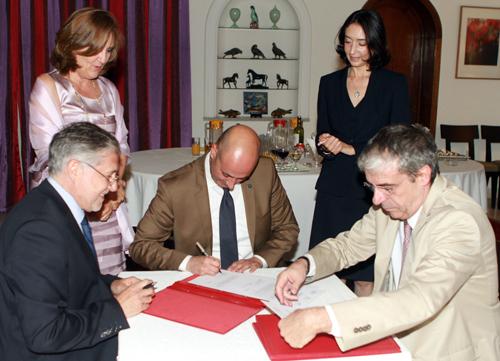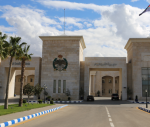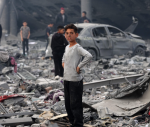You are here
French-Arab film festival to kick off Sunday
By Camille Dupire - Jun 21,2018 - Last updated at Jun 21,2018

Speakers announce the launch of the Franco-Arab Film Festival 2018 at the French Institute on Wednesday (Photo by Camille Dupire)
AMMAN — The second largest exporter of films after the United States, France has long been recognised as one of the most diverse and creative cinema industry in the world, French Ambassador to Jordan David Bertolotti said ahead of the 24th Franco-Arab Film Festival, set to begin on June 24.
Held under the patronage of HRH Princess Rym in collaboration with the Royal Film Commission (RFC) and the Greater Amman Municipality (GAM), the festival was officially announced on Wednesday at the French Institute in Jordan (IFJ), where local and French officials, representatives of cultural institutions and several directors and producers were present.
“Founded in 1994, the Franco-Arab film festival has become one of the most important film festivals in Jordan. It truly embodies the strength of bilateral relations between France and the Arab world and we are proud to present films jointly produced between France and Arab countries,” IFJ Director Stephane Delaporte, said at the press conference.
“This year’s festival will revolve around the theme of forced or voluntary migration, and the internal displacement of young people who claim their rights; the aspirations they have for equality, justice and freedom,” he continued, stressing “these issues are obviously shaped by complex family ties, intergenerational tensions, social conflict and society. But, even if the themes are thorny, the sense of humour in those movies eases the pain reflected in those movies from Iraq to Palestine, Morocco or France.”
He voiced his appreciation to all the directors and producers involved in the event, the supporting partners as well as the speakers at the presser Nada Doumani from the RFC, Shima Al Tal from the GAM, “Wajib” director Annemarie Jacir and “17” director Widad Shafakoj.
The festival, which will include movies from Algeria, Egypt, France, Iraq, Jordan, Morocco, Palestine and Tunisia, will include 11 free movie screenings from June 24 to July 1st, as well as a short film evening on Monday 25.
“This year’s edition will include films that represent resolutely contemporary themes in a very complex world. In each selected movie — wheteher documentary or fiction — we find a youth who learns to navigate through this complexity as well as possible, and that sometimes suffers from it,” said HRH Princess Rym Ali, who is also the founder of the Jordan Media Institute, in the festival statement.
“Sons trying to impress their fathers or parents trying to support their daughters; tense relations between generations or opportunities to learn from each other: this programme is a microcosm of societies which are similar to the rest of the world,” she continued, stressing “It is a rich selection that also testifies to the growing role of Arab cinema as a means of expression chosen by young talents who clearly seek to denounce, visually, a social status quo that weighs on them.”
Quoting the French Minister of Culture Francoise Nyssen, she concluded: "To change behaviours, it is necessary to change the outlooks and therefore the images."
This year will also present the 12th edition of the Jordanian short films competition, whose two winners for the best narrative and best documentary will be invited to present their films at the French edition of the Franco-Arab Film Festival in Paris in November 2018.
For French Ambassador David Bertolotti, “besides being a strong model of cinematic diversity, France is also a strong supporter of the productions of Southern and emerging countries, especially in the Middle East,” attributing the durability of the festival, which runs its 24th edition to “the proof that this relationship is strong and alive”.
“Our purpose is to tell the world in its diversity. This festival is the place of expressions of the evils of this world but also of the hopes of a region tormented by wars, terrorism, social and economic crises,” he told The Jordan Times, adding “the films of the 2018 selection draw on this reality to analyse, sublimate and sometimes transcend it.”
In addition to the screenings, the festival will also feature meetings with guests and filmmakers, master classes on the cinema indutry, run by Walid Mattar, Sofia Djama and Lyna Khoudri, as well as various workshops and discussions, according to an IFJ official.
Related Articles
AMMAN — Jordan and France are set to cooperate more closely in the area of film production and distribution, under an agreement signed Wedne
AMMAN — This year’s return of the Amman International Film Festival (AIFF) will continue to highlight debut achievements in film from around
AMMAN — The 21st Franco-Arab Film Festival concluded late last week, with the closing Falcon Awards ceremony recognising the winners of the


















